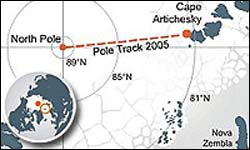
In a few days, a three-man scientific expedition called Pole Track is to embark upon a gruelling 1000 km trek across the frozen Arctic to collect valuable data for climate-change research. Throughout the demanding two-month expedition, the team will also take thousands of snow depth measurements in support of ESA’s CryoSat mission.
The international Pole Track team is led by the Dutch professional explorer Marc Cornelissen who is passionate about the polar environment and de
The retreat of Antarctic ice shelves is not new according to research published this week (24 Feb) in the journal Geology by scientists from Universities of Durham, Edinburgh and British Antarctic Survey (BAS).
A study of George VI Ice Shelf on the Antarctic Peninsula is the first to show that this currently ‘healthy’ ice shelf experienced an extensive retreat about 9500 years ago, more than anything seen in recent years. The retreat coincided with a shift in ocean currents t
Using high-intensity ultrasound, researchers at the University of Illinois at Urbana-Champaign have created hollow nanospheres and the first hollow nanocrystals. The nanospheres could be used in microelectronics, drug delivery and as catalysts for making environmentally friendly fuels.
“We use high-intensity ultrasound to generate nanoparticles of molybdenum disulfide or molybdenum oxide, which bind to the surface of tiny silica spheres that are much smaller than red blood cells
In a few days, a three-man scientific expedition called Pole Track is to embark upon a gruelling 1000 km trek across the frozen Arctic to collect valuable data for climate-change research. Throughout the demanding two-month expedition, the team will also take thousands of snow depth measurements in support of ESA’s CryoSat mission.
The international Pole Track team is led by the Dutch professional explorer Marc Cornelissen who is passionate about the polar environment and de
Although predicting el Nino events months before they begin has become a major success story in climate prediction, a Duke University oceanographer who did early research in the field believes more could be done with the computer and satellite technology underlying these advances.
Richard Barber, who is Harvey W. Smith Professor of Biological Oceanography at Duke’s Nicholas School of the Environment and Earth Sciences, will outline additional uses of el Nino forecasting at a
It will be possible to forecast any natural or social cataclysm by attentively observing the speed of the Earth’s rotation and shift of its poles.
The Earth rotates non-uniformly, its poles move, and the rotation axis fluctuates in space. According to the opinion of N.S. Sidorenkov, Doctor of Science (Physics&Mathematics), knowledge of reasons and regularities of our planet’s movement gives the opportunity to forecast with high precision the weather, earthquakes, convulsion of